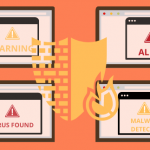In this technology filled world, it’s hard to make sure that you are staying safe at home and at work. In this blog post, we will talk about the 10 best steps you can take to make sure you are safe.
Tip #1: You are a target to hackers
Don’t say that being hacked won’t happen to you. Everyone is at risk and the stakes are high – your personal life, finances, and your employer’s standing and reputation.
- Keep computing resources secure is everyone’s responsibility.
- By following all these tips, you’re doing your part to keep other protected.
Tip #2: Keep software updated
Making sure that software for your OS and programs are updated is important. Always make sure that the latest version updates for your devices are on your devices.
- On your operating system, turn on Automatic Updates.
- Try to use browsers such as Chrome or Firefox – these receive frequent security updates that are automatic.
- Keep browser plug-ins (ex, Flash, Java) updated.
- Use a tool to find other software on your device that need to be up to date.
Tip #3: Avoid phishing scams – beware of suspicious emails and phone calls
Phishing scams have become a constant threat to worry about. This is done via social engineering ploys where cyber attackers will try to trick a user into giving personal info to them (ex, login username, password, banking info, credit card number, etc.).
- This type of scam can be done through email, phone calls, text, or even social media sites.
- By wary of any official looking email messages or phone calls that are asking for either your personal or financial information.
Tip #4: Practice good password management
Everyone has multiple passwords to manage, and it is easy and tempting to take short-cuts (ex, using the same password for a variety of accounts). A password management program can help you use strong unique passwords for all the accounts you use. These types of programs generate passwords for you, enter the credentials automatically, and remind you when to update your passwords periodically.
- Use long passwords.
- Use a mix of characters.
- Don’t use the same password for multiple sites.
- Don’t share passwords or write them down (especially not on a post-it note that is attached to your device).
- Update all passwords periodically – at least every 6 months, 90 days is recommended.
Tip #5: Be careful what you click
Avoid visiting websites that are unknown as well as avoid downloading software from untrusted sources. Sites that are unknown are often hosting malware that will install automatically, and often silently, compromise your device.
If attachments or links in emails come from unexpected or suspicious, don’t click on them.
ISP recommends that everyone should utilize browser add on features that will prevent automatic downloads of plug-in content and scripts that can hold malicious code.
Tip #6: Never leave your devices unattended
The physical security of all your devices is as important as the technical security.
- If you are leaving any of your devices (phone, computers, tablets) for any length of time, make sure to lock them so now one else can use them.
- If you have any sensitive data on a flash drive or external hard drives, make sure to keep them locked.
- For computers that are desktop versions, lock your screen or shutdown the system when you aren’t using them.
Tip #7: Protect sensitive data
Be aware of any sensitive data that you come into contact with as well as the restrictions.
- Keep data that is sensitive (ex, SIN, credit card info., health info., etc.) off of your workstation, laptop, phones, or any other device.
- Remove sensitive data files securely from your system when they are no longer needed.
- Always make sure to use encryption when you are storing and transmitting sensitive data.
Tip #8: Use mobile devices safely
Since we all use our devices all the time as well as rely on them, they are very susceptible to be attacked. Make sure that your device is protected.
- Lock your phone with a PIN/password. Don’t leave it unprotected in public.
- Only install apps that are from trusted sources.
- Make sure your phone’s OS is constantly updated.
- Don’t click on any attachments or links from suspicious emails or texts.
- Avoid transmitting or storing any personal info on the device.
- Most cell phones are capable of employing data encryption. Check out your phones documentation for available options.
- Utilize Apple’s “Find my iPhone” or Android’s “Android Device Manager” tools to help with preventing loss or theft.
- Backup data.
Tip #9: Install anti-virus protection
Install anti-virus programs that come from a trusted source that is known. Keep your virus protection, search engines, and software updated to make sure that the anti-virus program you have remains effective.
Tip #10: Back up your data
On a regular basis, back up your data, If you’re a victim of a security incident, the only way to make sure you can fix your computer is to erase and reinstall the system.
Additional tips:
- Use a firewall.
- Use public wireless hotspots wisely.
- Be conscious of what you plug into your computer.
- Be careful what you share on social media.
- Monitor accounts for activity that is suspicious.
- Bank and shop online online only on devices and networks your trust.
Let us know if you have any other safety tips that you follow and recommend. If you have any questions or comments, feel free to use the spot below!
Source:
Berkeley. (2017). Top 10 Secure Computing Tips. Retrieved March 28, 2019 from, https://security.berkeley.edu/resources/best-practices-how-to-articles/top-10-secure-computing-tips


